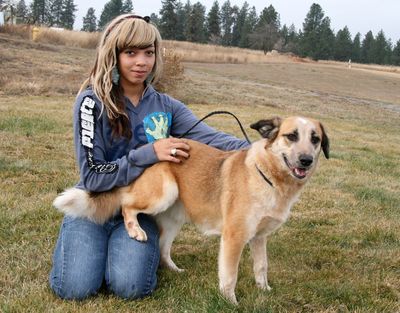Program helps at-risk teens and shelter dogs

Seirra Howard’s future may be brighter thanks to a heeler mix named Diesel.
Classified as an at-risk youth following a 2009 arrest, 18-year-old Howard came to know and train Diesel through a program called Pawsitive Works.
“Pawsitive Works let me know I actually could work with animals professionally, and enjoy what I’m doing,” said Howard, who plans to become a dog trainer.
Howard, one of 69 youths who have gone through the program, learned about it through her probation officer.
“She knew I loved animals,” said Howard, who has three dogs and four cats.
Pawsitive Works is the brainchild of founder and executive director Karen Schumacher. A nonprofit organization, it is dedicated to helping youth through canine intervention.
The program engages at-risk youth to train behaviorally challenged shelter dogs. The youth help the dogs become adoptable. The program boasts a 95 percent adoption rate for animals that have “graduated.”
With 20 years experience as a professional dog trainer and therapy pet professional, Schumacher’s inspiration for the program came more than 10 years ago while working with animals in the Seattle area. She was observing a canine program for incarcerated youth and saw a need to develop a program for those not behind bars.
After a 2005 move to Bonners Ferry, Idaho, she began developing the program and its curriculum. Launched in 2009, Pawsitive Works works with youth in Eastern Washington and North Idaho.
The program guides teens through a curriculum of reading, writing and animal training exercises – such as positive reinforcement, treats and clicker training – designed to create behavior modifications in both the youth and dogs. Or as Schumacher puts it, “shape both ends of the leash.”
The concept is as youth identify ways to correct certain behaviors in the animals; they apply the same principles to themselves.
“You have to act how you want the dog to act,” Howard said. “If you want the dog to be calm, you have to be calm.”
Typically, the five-week program pairs participants, ages 13 to 18, with an animal with similar character traits. For example, a shy young girl may be paired with shy dog to learn how to speak up.
In Howard’s case, however, she was paired with the opposite behavior in Diesel.
“He didn’t behave very well compared to other dogs,” Howard said describing Diesel. “He was very nervous like he had been beaten before.
“They took me aside after class, and said they thought I was going to do real well in the class,” she said. “So they gave me the dog that was possibly going to be the most difficult.”
Through hours of consistent training, and a lot of patience, she trained the dog no one else wanted to crawl, sit, lie down, leave it, heel and shake.
“I’m really glad I had Diesel,” Howard said, recalling with pride how she had Diesel crawl across the floor during graduation.
Schumacher notes that teens can reap benefits from the program and gain higher self-esteem and self-worth, empathy, patience, communication skills and community involvement.
“It may be the first time in their life they have someone counting on them,” Schumacher said. “They can say they made something happen.”
Last fall Schumacher partnered with the Community School, a project-based high school in north Spokane, and the Spokane Humane Society. It was the first time the program was applied to youth not at risk.
The Community School’s principal, Cindy McMahon, became aware of the program after hearing Schumacher give a presentation on the connection between animals and building compassion.
“We decided the program would be in alignment with the values at the Community School,” McMahon said. “It just seemed like a natural fit.”
Seventeen-year-old Ericka Evans, a junior at the Community School, said the program helped her gain better communication skills.
“I’m more sensitive to what I say and how I’m saying it,” Evans said.
McMahon said she hopes to continue the program at the school this spring, but first $1,500 must be raised to cover costs.